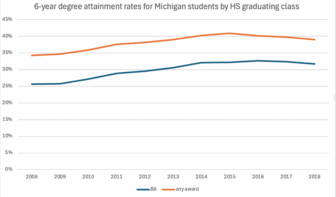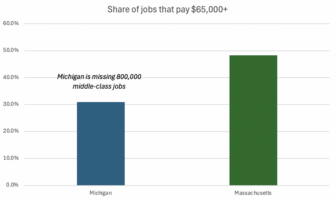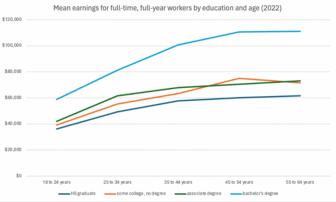
This post was originally written for and published by Inside Higher Education. They generously gave us permission to publish the post.
It lays out reasons why expanding expanding federal Pell grant funding to obtaining short-term certificates may not be good for either students or community colleges. The same cautions apply to Michigan including short-term credentials in its goal of 60 percent of Michigan adults having post-secondary credentials by 2030. If the goal of both federal and state policy makers is to improve the economic advancement and well being of students, there is evidence that Associate or Bachelor’s Degrees are much more valuable, over a career, than a short-term certificate or even a series of short-term certificates.
Providing Pell funds for short-term training programs stands out as one of the few creative federal initiatives of interest for community college workforce practitioners. Colleges would have the ability to offer educational programs in bite-size pieces to suit the needs of working adults, significantly advancing efforts to bring together credit and noncredit workforce opportunities into a coherent system.
However, this concept may be a giant step backward for these institutions and the students they serve unless the proposed changes to Pell are given careful consideration. I offer three potential unintended consequences for social and economic equity that policy makers so far have failed to address with bills that would open up Pell Grants to shorter-term programs.
First, the jury is still out on how effective short-term training programs are in raising wages or increasing employment. After all, community college students (and all post-secondary students) go to college to learn skills to get a better job and make more money. Recent empirical research by the Community College Research Center at Columbia University’s Teachers College indicates that while some credentials do provide increased earnings, over all the majority do not provide significant wage increases — especially when compared to programs that lead to a degree.
Though touted among policy wonks, the “stacking” of credentials into an aggregation of mastered skills that can produce degrees is a process that lacks coherence among the majority of community colleges and offers little data to support employment or income gains. Perhaps equally important, there is no significant growth in employer acceptance of certificates instead of degrees. During my time as president of Michigan’s Macomb Community College, I found that degrees always matter to employers more than any other measurement of success in hiring our students.
Second, investing Pell in short-term training may not advance long-term job prospects for students. Most predictions on the future of work suggest sustaining employment will depend on workers’ abilities to master new skills on the job. Short-term training programs tend to develop specialized skills, which may get an individual a job in the near term, but not necessarily include the foundational competencies that can affect income mobility — where it counts — on the job. Indeed, the short-term approach reinforces the overspecialization of skills training, which many employers have historically complained about, while also underemphasizing the need for foundation skills.
Finally, opening up Pell to short-term training may result in an increase of tracking less prepared students into these programs.
Take the flagship community college workforce program — nursing. In almost every community college, this program is in high demand, with far more students applying than can be accepted. As a result, “options” are then offered to underprepared students — often low-income students of color — into certificate programs for nursing aides, or at best licensed practical nurse (L.P.N.) programs.
The reality is that few of these options create pathways into nursing. Apply this trend to manufacturing, information technology and other occupational training programs and the potential unintended consequence is that certificate “completion” no longer establishes a floor for students to continue their studies, but rather imposes a ceiling that can prevent students from moving upward. Further, proliferation of certificate programs in this way risks creating a two-tiered community college completion system, effectively exacerbating education inequality.
This does not mean there is no role for Pell funding of short-term training. In fact, simple but important modifications could be adapted to help ensure that some of the above-mentioned abuses do not occur.
First, all short-term federal funding should be targeted toward pathways for degree completion. Short-term programs can initiate a start in college for a student, but they must also be part of a program that includes foundation skills and the possibility of earning a degree. In addition, job-quality criteria must be part of short-term Pell. That means colleges offering short-term training that leads to a certificate must demonstrate that those credentials have value in the labor market. And if legislation allows companies to accept Pell funding to provide short-term training, they must show that those federal subsidies enhance individual workers’ wages and increase employment upon completion. Otherwise employers should be liable for the costs associated with the training.
Finally, institutions who use short-term training will be obligated to provide outcomes data on their graduates to demonstrate wage gains and community growth.
Educational policy has always been characterized by a search for new innovations to make things better for students. Change should be considered especially to promote equity. But we need to remember the vision that created Pell as an intergenerational program to promote mobility and economic opportunity. We need to maintain this perspective as we consider whether short-term programs should have access to Pell.
Jim Jacobs is president emeritus at Macomb Community College and a research affiliate at the Community College Research Center at Columbia University’s Teachers College.






